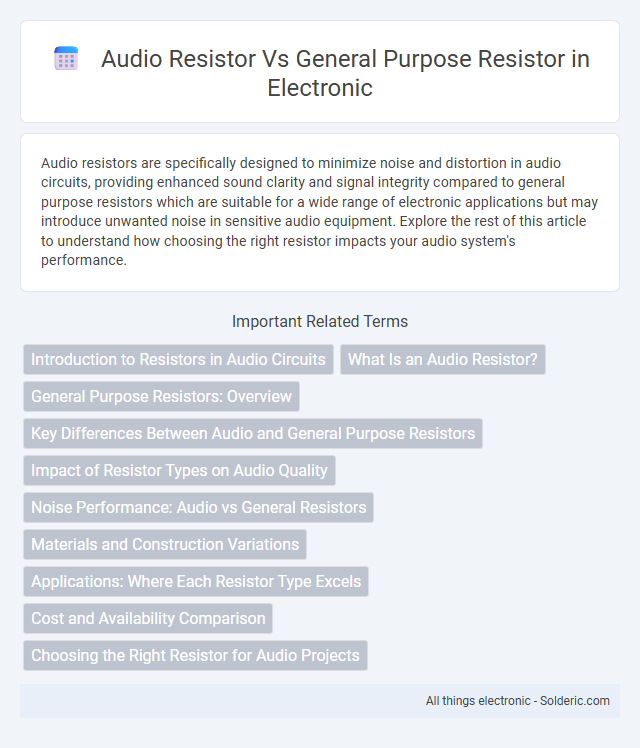Audio resistors are specifically designed to minimize noise and distortion in audio circuits, providing enhanced sound clarity and signal integrity compared to general purpose resistors which are suitable for a wide range of electronic applications but may introduce unwanted noise in sensitive audio equipment. Explore the rest of this article to understand how choosing the right resistor impacts your audio system's performance.
Comparison Table
| Feature | Audio Resistor | General Purpose Resistor |
|---|---|---|
| Purpose | Designed for low noise in audio circuits | Used for basic electrical resistance tasks |
| Noise Level | Low noise, high audio fidelity | Higher noise, less suitable for audio |
| Tolerance | Typically +-1% or better | Commonly +-5% to +-10% |
| Material | Metal film or carbon composition | Carbon film, metal oxide, or wirewound |
| Power Rating | Usually 0.25W to 0.5W | Varies widely, 0.125W to several watts |
| Frequency Response | Stable across audio frequency range | Not optimized for audio frequencies |
| Cost | Higher cost due to precision and materials | Lower cost, mass-produced |
Introduction to Resistors in Audio Circuits
Audio resistors are specifically designed to minimize noise, distortion, and signal loss in sensitive audio circuits, featuring metal film or carbon composition materials for stable resistance and low microphonics. General purpose resistors, such as carbon film or metal oxide types, provide reliable performance in a wide range of electronic applications but may introduce unwanted noise and signal degradation when used in high-fidelity audio paths. Selecting audio-grade resistors enhances sound clarity and fidelity by maintaining consistent resistance under varying temperatures and electrical stresses.
What Is an Audio Resistor?
An audio resistor is a type of resistor specifically designed to minimize noise and distortion in audio circuits, offering superior audio fidelity compared to general purpose resistors. These resistors often feature specialized materials and construction techniques to ensure stable resistance and low inductance, which are critical for high-quality sound reproduction. Choosing an audio resistor for your sound equipment can significantly enhance the clarity and accuracy of your audio signals.
General Purpose Resistors: Overview
General purpose resistors are designed for a wide range of electrical and electronic applications, offering reliable performance under standard conditions. They typically feature carbon film, metal oxide, or metal film construction, ensuring durability and consistent resistance values across various circuits. Your projects benefit from their versatility and cost-effectiveness, making them a popular choice for everyday use in consumer electronics and industrial equipment.
Key Differences Between Audio and General Purpose Resistors
Audio resistors are designed with lower noise levels and tighter tolerance to maintain sound fidelity, whereas general purpose resistors prioritize broad application and cost-effectiveness over noise performance. Their construction often involves specialized materials and coatings to minimize microphonic effects and thermal noise, critical in audio circuits. Your choice of resistor impacts audio clarity and signal integrity, especially in high-fidelity audio equipment.
Impact of Resistor Types on Audio Quality
Audio resistors are specifically designed to minimize noise, distortion, and tolerance variations, directly enhancing the clarity and fidelity of sound signals. General purpose resistors may introduce unwanted hiss and signal degradation due to higher noise levels and less precise values, impacting the overall audio quality. Choosing the right resistor type ensures your audio circuits deliver optimal performance, preserving the integrity of your sound.
Noise Performance: Audio vs General Resistors
Audio resistors are specifically designed to minimize noise, offering superior noise performance compared to general-purpose resistors, making them ideal for high-fidelity audio circuits. Their low thermal noise and reduced microphonic effects ensure cleaner signal transmission, which is crucial for maintaining audio clarity. Choosing audio resistors for your sound equipment can significantly reduce unwanted noise and improve overall acoustic quality.
Materials and Construction Variations
Audio resistors are designed with materials such as metal oxide or metal film to minimize noise and ensure stable performance in high-fidelity audio circuits. General purpose resistors often use carbon composition or metal oxide but may lack the precision and low noise characteristics crucial for audio applications. Your audio circuits benefit from the specialized construction of audio resistors, which enhances sound quality through reduced distortion and improved frequency response.
Applications: Where Each Resistor Type Excels
Audio resistors excel in high-fidelity audio circuits by providing low noise and maintaining stable resistance under varying frequencies, making them ideal for amplifiers, mixers, and audio signal processing. General purpose resistors suit a broad range of everyday electronic applications, such as power supplies, LED circuits, and digital devices, where precision and noise performance are less critical. Your choice depends on the need for low distortion and noise levels in audio applications versus cost-effective, versatile performance in general electronics.
Cost and Availability Comparison
Audio resistors typically cost more than general-purpose resistors due to their specialized construction and tighter tolerance, ensuring low noise and high stability for audio applications. General-purpose resistors are widely available and produced in large quantities, resulting in lower prices and easier procurement. The cost differential is justified by audio resistors' enhanced performance requirements, but general-purpose resistors remain the cost-effective choice for non-critical uses.
Choosing the Right Resistor for Audio Projects
Choosing the right resistor for audio projects involves selecting components that minimize noise and distortion to preserve sound quality. Audio resistors, often fabricated with metal film or carbon composition, provide superior stability and low noise compared to general-purpose resistors made from carbon film or wirewound materials. Your audio circuits benefit from using resistors specifically engineered for high-frequency and low-noise performance to achieve clearer, more accurate sound reproduction.
Audio resistor vs general purpose resistor Infographic

 solderic.com
solderic.com